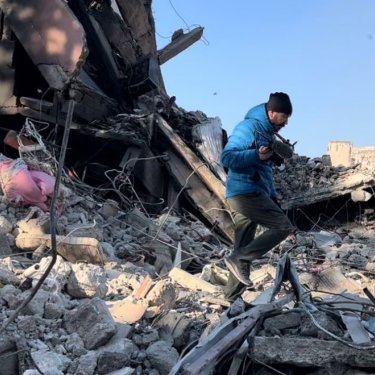RSF reports many press freedom violations since Türkiye’s earthquake

Journalists trying to cover the situation on the ground in Türkiye since the massive earthquake on 6 February have been obstructed by the Turkish authorities repeatedly and in a variety of ways, says Reporters Without Borders (RSF), urging the authorities to end their unacceptable harassment and interference and to respect the right to report the news.
The press freedom violations monitored by RSF since the earthquake have included physical violence, arrests, judicial proceedings, online attacks and restrictions on access to Twitter. Journalists have been accused of “defaming the police or the state.” Attempts to control the disaster narrative and coverage of the response by the authorities are becoming more and more visible.
“The Turkish authorities must not exploit the tragedy in Türkiye to obstruct press freedom even more. The many restrictions, attacks, arrests and cases of intimidation of journalists are alarming and must stop at once. Reporters who have been sent to the devastated cities are just doing their job and are working in terrible circumstances. Their reporting is proving to be more essential than ever for everyone.
Aggression, expulsion, arrest and intimidation
On 8 February alone, RSF registered three cases of journalists being arrested on spurious grounds. Mahmut Altintas, a reporter for the pro-Kurdish Mesopotamia Agency (MA), and Sema Caglak, a reporter for the women’s news site JinNews, were arrested in Birecik for not having the official press card, while MA reporter Mehmet Güles was arrested with a volunteer rescue worker in Diyarbakir on suspicion of “inciting hatred.” He was later released under judicial control.
Journalists have also reported being physically attacked and threatened by police. Ferit Demir, a reporter for Halk TV, a TV channel critical of the government, said he was kicked repeatedly by a member of the counter-terrorism police while covering the deployment of the government’s Agency for Natural Disaster Management (AFAD) in the southeastern province of Malatya.
Irem Afsin, a journalist working for an international media outlet, said Urfa province’s police chief threatened her on 8 February, saying: “if you dare to speak badly of our state, I will cut you off, I will throw you out of here and I will deal with you.” She said the police became more hostile after President Erdogan declared a three-month state of emergency on 7 February in the ten cities hit by the earthquake.
The restrictions on foreign media have also been tightened. The Presidential Department for Communication is imposing an accreditation procedure for international media outlets that want to go to quake-hit areas and talk to victims. Guillaume Perrier, a well-known reporter for the French weekly Le Point, was denied entry on 8 February, when he discovered that he had been banned from Türkiye since November on the grounds that his reporting posed a ”threat to national security.”
Controlling the disaster narrative?
Online information has also been restricted. Internet bandwidth was severely limited for more than 10 hours on 7 February, at a time when the ruling Justice and Development Party (AKP) was coming under intense criticism for its disaster management, which was being accused of contributing to the toll.
The Internet governance watchdog NetBlocks reported on 8 February that its data had confirmed restrictions on access to Twitter. “The filtering is applied on major internet providers and comes as the public come to rely on the service in the aftermath of a series of deadly earthquakes,” NetBlocks said. The restrictions triggered an outcry on social media, as Twitter has been used not only by the scores of journalists operating in the quake-hit regions but also by members of the public to transmit calls for help.
There have been many online verbal attacks on journalists by both trolls and politicians, including Elif Sahin, a ruling party representative in Istanbul, who said in a tweet on 13 February that “the foreign media have become the voice of a handful of individuals who detest the state.”
Seyhan Avsar – who had reported that a youth died after being arrested for “looting” in Altinözü, a town near Antakya – is one of the journalists who has been the target of an intimidation campaign on social media. They also include Deniz Zeyrek, a reporter and commentator for Türkiye’s critical Fox TV channel, who said: “The authorities are trying to gain the upper hand, at a time when outrageous negligence and incompetence is evident in this disaster.”
Broadcasters warned
The High Council for Broadcasting (RTÜK) – which is dominated by the ruling AKP and its coalition partner, the MHP – set an aggressive tone within hours of the earthquake on 6 February, issuing a stern warning to outspoken media outlets that were echoing the growing reactions and appeals for help from the disaster-hit regions in southeastern Anatolia.
“Broadcasters have a legal responsibility not to relay information that constitutes disinformation or drives people to panic,” RTÜK president Ebubekir Sahin warned. “We are closely following those who seek to fabricate a completely alternative perception while all the authorities, including the army and the police, are deployed on the ground. We cannot turn a blind eye to media that indulge in manipulation.”
But Okan Konuralp, a member of the opposition to RTÜK, lost no time in encouraging the media to work freely. “Don’t let yourselves be intimidated by these threats,” he said. “What the nation needs above all today is solidarity and the truth.”
The earthquake killed around 20 journalists in Antakya, Gaziantep and Adiyaman. The overall death toll is currently put at around 32,000.
